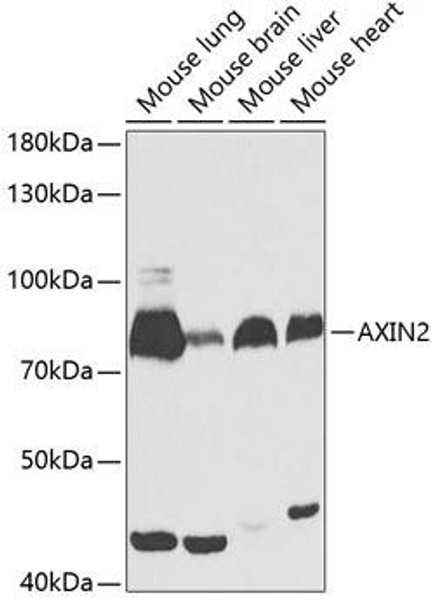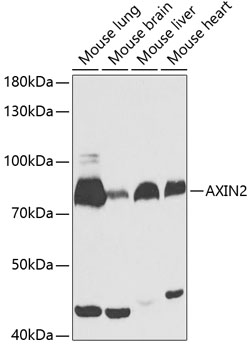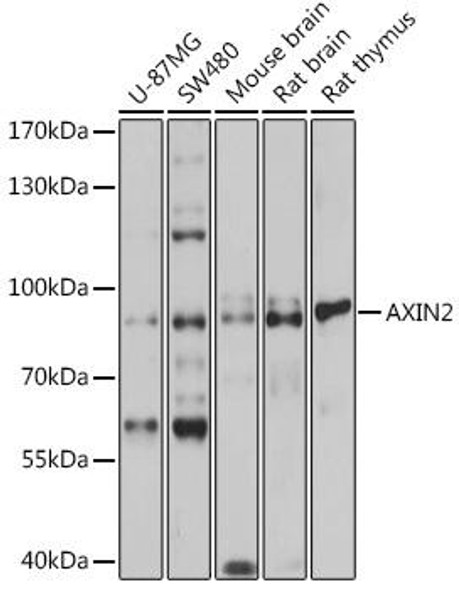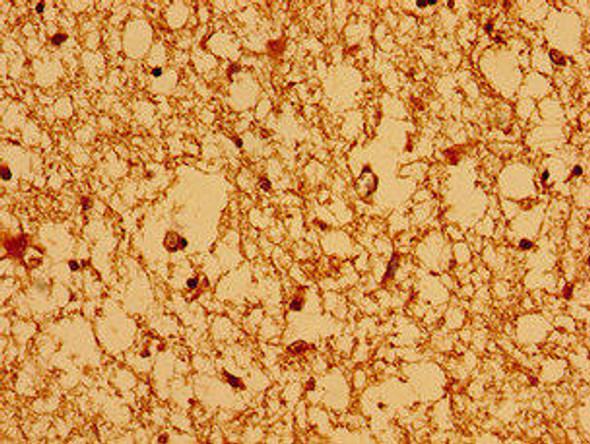Anti-AXIN2 Antibody (CAB13373)
- SKU:
- CAB13373
- Product Type:
- Antibody
- Reactivity:
- Human
- Mouse
- Host Species:
- Rabbit
- Isotype:
- IgG
- Antibody Type:
- Polyclonal Antibody
- Research Area:
- Metabolism
Description
Anti-AXIN2 Antibody (CAB13373)
The Axin2 Polyclonal Antibody (CAB13373) is a valuable tool for research involving the Axin2 protein, a key regulator of the Wnt signaling pathway. This antibody, produced in rabbits, exhibits high reactivity with human samples and has been validated for use in Western blot applications. By specifically binding to Axin2, this antibody enables the detection and analysis of Axin2 protein levels in various cell types, making it an essential tool for studies in cell signaling and cancer research.Axin2 is a crucial component of the Wnt signaling pathway, which plays a significant role in development, tissue homeostasis, and cancer progression.
Dysregulation of the Wnt pathway, including aberrant Axin2 expression, has been linked to various diseases, such as colorectal cancer and Alzheimer's disease. Investigating the function and regulation of Axin2 is essential for understanding its role in these pathologies and for the development of potential therapeutic interventions targeting the Wnt pathway.
| Antibody Name: | Anti-AXIN2 Antibody |
| Antibody SKU: | CAB13373 |
| Antibody Size: | 20uL, 50uL, 100uL |
| Application: | WB |
| Reactivity: | Human, Mouse |
| Host Species: | Rabbit |
| Immunogen: | Recombinant fusion protein containing a sequence corresponding to amino acids 1-130 of human AXIN2 (NP_004646.3). |
| Application: | WB |
| Recommended Dilution: | WB 1:500 - 1:2000 |
| Reactivity: | Human, Mouse |
| Positive Samples: | Mouse lung, Mouse brain, Mouse liver, Mouse heart |
| Immunogen: | Recombinant fusion protein containing a sequence corresponding to amino acids 1-130 of human AXIN2 (NP_004646.3). |
| Purification Method: | Affinity purification |
| Storage Buffer: | Store at -20'C. Avoid freeze / thaw cycles. Buffer: PBS with 0.02% sodium azide, 50% glycerol, pH7.3. |
| Isotype: | IgG |
| Sequence: | MSSA MLVT CLPD PSSS FRED APRP PVPG EEGE TPPC QPGV GKGQ VTKP MPVS SNTR RNED GLGE PEGR ASPD SPLT RWTK SLHS LLGD QDGA YLFR TFLE REKC VDTL DFWF ACNG FRQM NLKD TKTL RV |
| Gene ID: | 8313 |
| Uniprot: | Q9Y2T1 |
| Cellular Location: | Cytoplasm |
| Calculated MW: | 93kDa |
| Observed MW: | 85kDa |
| Synonyms: | AXIN2, AXIL, ODCRCS, axin-2 |
| Background: | The Axin-related protein, Axin2, presumably plays an important role in the regulation of the stability of beta-catenin in the Wnt signaling pathway, like its rodent homologs, mouse conductin/rat axil. In mouse, conductin organizes a multiprotein complex of APC (adenomatous polyposis of the colon), beta-catenin, glycogen synthase kinase 3-beta, and conductin, which leads to the degradation of beta-catenin. Apparently, the deregulation of beta-catenin is an important event in the genesis of a number of malignancies. The AXIN2 gene has been mapped to 17q23-q24, a region that shows frequent loss of heterozygosity in breast cancer, neuroblastoma, and other tumors. Mutations in this gene have been associated with colorectal cancer with defective mismatch repair. |
| UniProt Protein Function: | axin 2: is a negative regulator of the Wnt pathway, which is critical in stem cell signaling, morphogenesis, the mesenchymal-epithelial transition, and many cancers. Axin functions as a tumor suppressor. Probably facilitates the phosphorylation of beta-catenin and APC by GSK3B, leading to their ubiquitination and subsequent proteolysis. Is downregulated during progression of esophageal squamous cell carcinoma. Axin1/2 mediate cross-talk between TGF-beta and Wnt signaling pathways. |
| UniProt Protein Details: | Protein type:Adaptor/scaffold Chromosomal Location of Human Ortholog: 17q24.1 Cellular Component: nucleoplasm; microtubule cytoskeleton; Golgi apparatus; centrosome; cytoplasmic microtubule; cytoplasm; cytoplasmic membrane-bound vesicle; postsynaptic density; plasma membrane; cell cortex; cytosol; nucleus; beta-catenin destruction complex Molecular Function:protein binding; enzyme binding; ubiquitin protein ligase binding; beta-catenin binding; protein kinase binding; GTPase activator activity Biological Process: odontogenesis; negative regulation of cell proliferation; cell proliferation; intramembranous ossification; regulation of mismatch repair; mRNA stabilization; dorsal/ventral axis specification; negative regulation of osteoblast differentiation; positive regulation of protein amino acid phosphorylation; maintenance of DNA repeat elements; bone mineralization; positive regulation of GTPase activity Disease: Oligodontia-colorectal Cancer Syndrome |
| NCBI Summary: | The Axin-related protein, Axin2, presumably plays an important role in the regulation of the stability of beta-catenin in the Wnt signaling pathway, like its rodent homologs, mouse conductin/rat axil. In mouse, conductin organizes a multiprotein complex of APC (adenomatous polyposis of the colon), beta-catenin, glycogen synthase kinase 3-beta, and conductin, which leads to the degradation of beta-catenin. Apparently, the deregulation of beta-catenin is an important event in the genesis of a number of malignancies. The AXIN2 gene has been mapped to 17q23-q24, a region that shows frequent loss of heterozygosity in breast cancer, neuroblastoma, and other tumors. Mutations in this gene have been associated with colorectal cancer with defective mismatch repair. [provided by RefSeq, Jul 2008] |
| UniProt Code: | Q9Y2T1 |
| NCBI GenInfo Identifier: | 12643949 |
| NCBI Gene ID: | 8313 |
| NCBI Accession: | Q9Y2T1.1 |
| UniProt Secondary Accession: | Q9Y2T1,Q3MJ88, Q9H3M6, Q9UH84, |
| UniProt Related Accession: | Q9Y2T1 |
| Molecular Weight: | 843 |
| NCBI Full Name: | Axin-2 |
| NCBI Synonym Full Names: | axin 2 |
| NCBI Official Symbol: | AXIN2 |
| NCBI Official Synonym Symbols: | AXIL; ODCRCS |
| NCBI Protein Information: | axin-2; conductin; axin-like protein; axis inhibition protein 2 |
| UniProt Protein Name: | Axin-2 |
| UniProt Synonym Protein Names: | Axin-like protein; Axil; Axis inhibition protein 2; Conductin |
| Protein Family: | Axin |
| UniProt Gene Name: | AXIN2 |
| UniProt Entry Name: | AXIN2_HUMAN |










